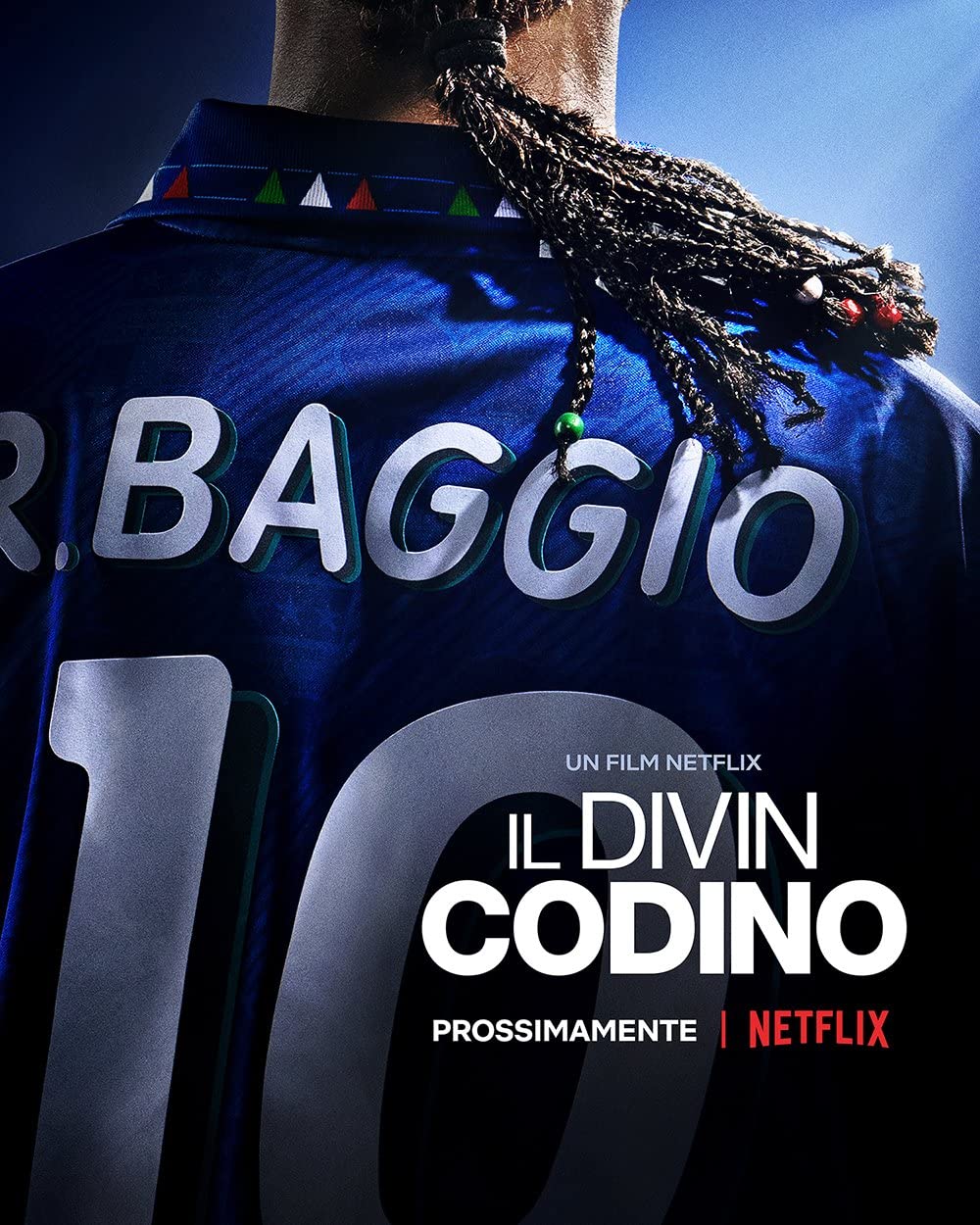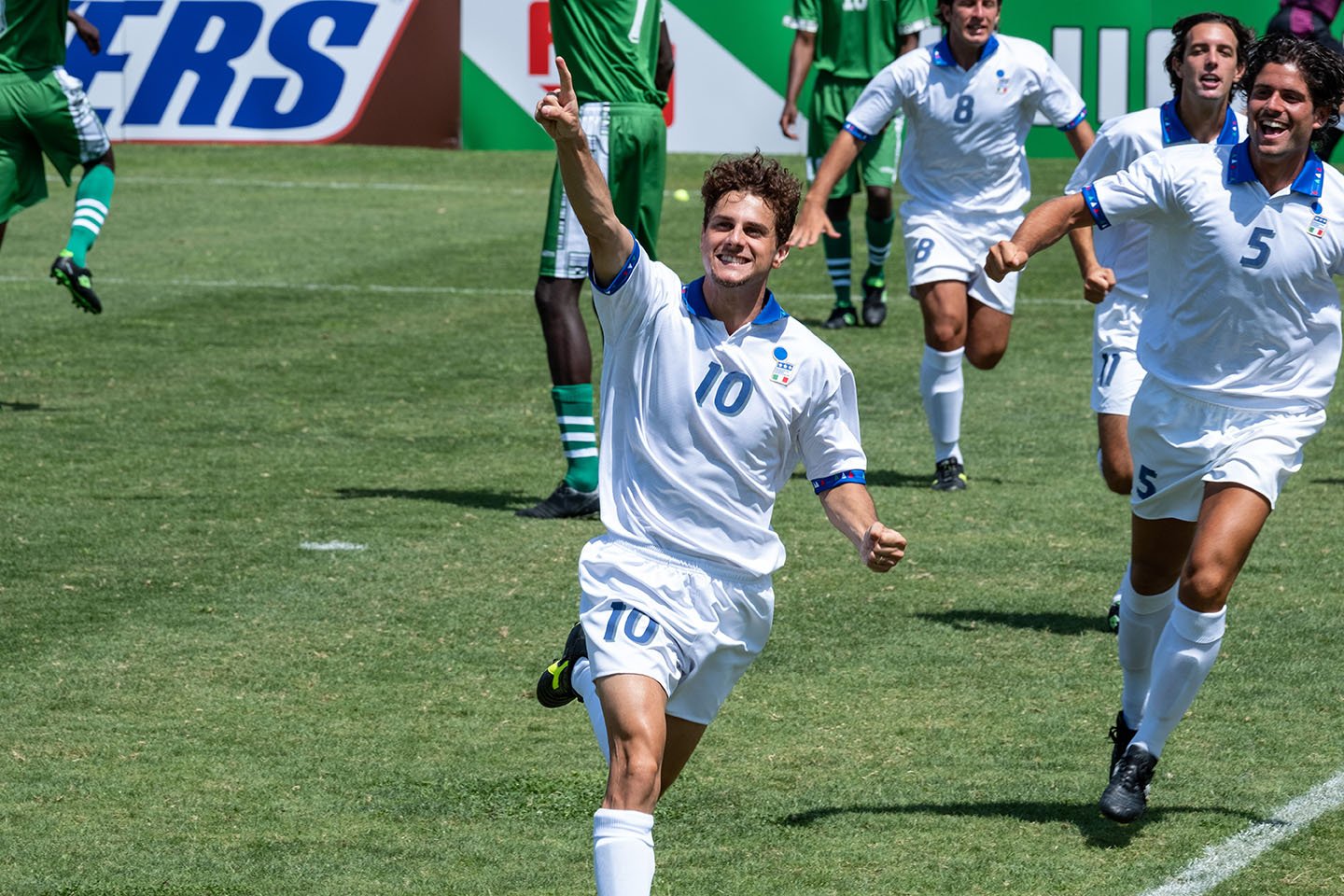Another month, another footy flick from Netflix. Released on Wednesday, Baggio: The Divine Ponytail puts a well-deserved spotlight on the universally beloved Roberto Baggio, but the film is not immune to the flaws that have plagued many a biopic before it.
A biopic can be very hit or miss, especially when the subject is sports and the player is still alive. The actor often fails to measure up to the person they’re playing because the audience can already directly experience that person. Also, the difference between the two in action sports scenes is quite evident. And the subject always has either too much or not enough input in the creative process. Omitting certain events or portions of a subject’s life becomes more glaring as well. And people begin to wonder, “Did they maybe make this too soon?”

Unfortunately, Baggio: The Divine Ponytail suffers from many of these flaws. That’s not to say it’s straight awful though. It just means that on the spectrum of biopics, it trends more towards Jobs than say, Lincoln.
Directed by Letizia Lamartire, the 92-minute film tells the story of legendary Italian soccer player Roberto Baggio. Known for his trademark ponytail, Baggio battled many injuries to become one of the most celebrated footballers of all time. The film also dives into his reputation off the pitch, exploring his conversion to Buddhism, and conflicts with various managers and his father.
While there are a few flashbacks to his childhood throughout, the film pretty much opens with a young Baggio, played by Andrea Arcangeli, at Vicenza. The phenom quickly moves to Serie A side Fiorentina, essentially the big leagues. In his last match for Vicenza though, Baggio suffers a knee injury. When he arrives in Florence, alone and now unable to play the game he loves, it’s clearly a very low point in his life. However, Baggio unexpectedly finds help after meeting a man named Maurizio in a record shop who introduces him to Buddhism.

The friendship that forms between Baggio and Maurizio is one of the movie’s few bright spots. As Maurizio becomes Baggio’s unofficial spiritual advisor, a beautiful friendship blossoms. He helps Baggio find his inner strength and define, and ultimately achieve, his goals of returning to the pitch and playing on the national team. In a predominantly Catholic country, Baggio’s conversion to Buddhism makes him a somewhat polarizing figure. His detractors, often his managers but also including his father, say Baggio is selfish and a locker room problem.
After regaining his confidence in Florence, the movie awkwardly jumps ahead six years in time to the 1994 World Cup. The way this portion of the film mixes together real footage with cheesy recreated CGI soccer scenes is decent at best. The whole montage is a bit newspaper headline heavy. During the tournament, the tension between Baggio and Italy’s manager Arrigo Sacchi, played by Antonio Zavaterri, constantly builds. It finally boils over when Baggio pulls up limping in the semifinals, and becomes paranoid Sacchi will sit him in the final against Brazil, which he evidently promised his father he would win when he was just 3 years old.
Baggio ends up playing in the final and it goes to penalty kicks, where he’d infamously miss his to help Brazil take the victory. Baggio is obviously gutted while his father is displeased. We then awkwardly fast forward another six years, which skip over Baggio winning a scudetto with AC Milan and a shot at redemption from the penalty spot in the 1998 World Cup quarterfinals. Instead, the film makes it seem like he goes into a deep depression and becomes a gardener post-1994 World Cup. Following conversations with his father, wife, and manager, Baggio decides he wants to return to football so he can feature in the 2002 World Cup.
He signs for Brescia, and his career begins to experience a renaissance. Following another newspaper headline-filled action montage, the new Italian national team manager promises Baggio he’ll be selected for the World Cup as long as he’s healthy. Of course, in the very next scene Baggio injures his knee again six months out from the tournament. Initially dejected and at rock bottom, Baggio then becomes as determined as ever to make the World Cup. He miraculously completes a six-month rehab program in three months and returns to the pitch, only to be denied a call up anyways.
Unsure of his next moves, Baggio goes on a hunting trip with his father. While out in the wilderness they finally have a conversation about Baggio’s career and their earlier relationship issues, including why his father was always so hard on him. Upon returning to town the pair stops at a gas station, and after paying for gas Baggio is mobbed by dozens of adoring fans as the World Cup roster is announced. He smiles and looks at his father, who smiles back. They both realize the joy Baggio’s brought to millions of Italians, and how loved he is by them. Fin. Kind of an unfulfilling ending, surely Baggio deserves better.
Final Verdict

We have a tough time recommending this film unless it’s a jumping off point for learning even more about Roberto Baggio or brushing up on your Italian. There’s definitely a need for this biopic, as Baggio is vastly underrated in history, but this just isn’t it. The film’s selective editing is a convenient choice to highlight Baggio’s issues with his father. On top of that, these issues are so over-emphasized they quickly become cliche.
Even worse yet, the CGI soccer scenes were awful, and it felt like the movie knew that — hence the endless newspaper headline montages. Baggio is considered by some to be Italy’s Maradona, universally beloved. If the film had been able to implement more realistic CGI soccer scenes, perhaps viewers would’ve been able to see how Baggio made football seem like an art form. And then they would understand why an entire nation fell in love with the divine ponytail.
Stream Baggio: The Divine Ponytail on Netflix.








